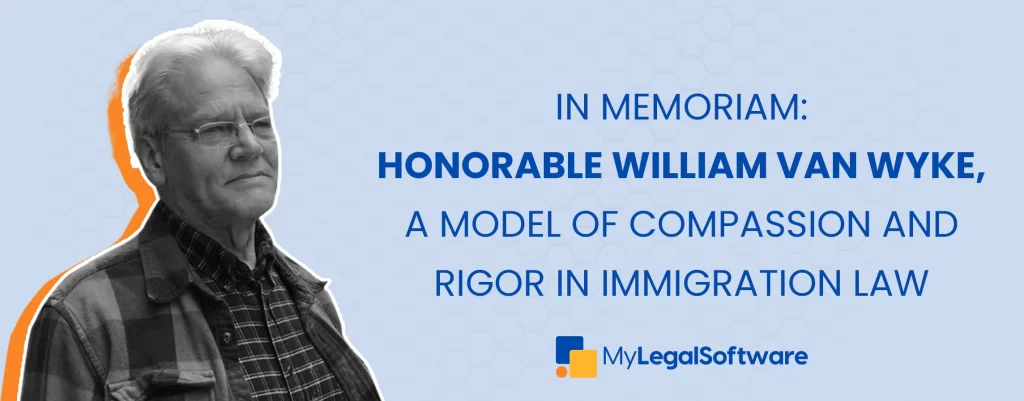Immigration attorneys nationwide join family, friends, and colleagues in mourning the Honorable Judge William Peter Van Wyke, whose passing on August 14, 2022, marked the loss of a steadfast champion for refugees and immigrants.
He had a distinguished career, first as a revolutionary advocate and later as a long-serving immigration judge. Judge Van Wyke combined legal rigor with deep compassion, leaving a legacy that continues to shape asylum law.
Pioneering Refugee Advocacy
Judge Van Wyke’s journey in immigration law began at a pivotal time in U.S. history. Following the passage of the Refugee Acimit of 1980, he became one of the first attorneys in the country to focus his legal practice on advocating for refugees, especially those fleeing violence and persecution in Central America.
He worked with organizations such as the Central American Refugee Center and AYUDA, then before international bodies like the Human Rights Commission of El Salvador, where he made arguments based on international human rights standards.
A Groundbreaking Case: In Re Santos and the Right of Non-Return
One of Judge Van Wyke’s most notable legal victories occurred in 1990 in the groundbreaking case In Re Santos. At a time when many Salvadoran refugees were being denied asylum. He argued that even Salvadorans deemed general conflict victims deserved protection under the international “right of nonreturn” as part of the “principle of non-refoulement.” He convinced a U.S. court to extend asylum-style safeguards beyond traditional persecution claims. It was the first decision by a U.S. court to affirm this principle and has become a strong legal precedent.:
Two Decades of Fairness on the Bench
In March 1995, Judge Van Wyke was appointed as an Immigration Judge, a role he would fulfill with dedication before retiring in 2015. He presided over 3,200 asylum cases, granting relief in over 2,700 of them, a remarkable approval rate of nearly 85%.
Colleagues and attorneys who appeared in his courtroom consistently praised him for his fairness, his respect for all parties, and his attentiveness to the emotional and legal challenges faced by immigrants, especially detained individuals and children. He was known for his patience, empathy, and belief that justice must be accessible.
A Legacy of Integrity
In 2001, when the Immigration and Naturalization Service (INS) sought to deport someone whose petition was delayed, Judge Van Wyke refused to issue the order. He administratively closed the case, publicly criticized the impropriety, and recused himself, earning the support of the immigration judges’ union in a formal protest. This stand for judicial independence made national headlines and underscored his belief that the rule of law must never be compromised.
Beyond his rulings, Judge Van Wyke’s greatest gift was mentorship. He welcomed young attorneys into his chambers, shared candid feedback, and modeled how civility and rigor go hand in hand.
Honoring a Family Man and Friend
William Van Wyke was a devoted husband, father of six, and grandfather of nine. The author, N.M. Gehi, Esq., extends heartfelt thanks to Judge Jeffrey S. Chase, former immigration judge and Board of Immigration Appeals (BIA) advisor, for ensuring the legal community learned of this great jurist’s passing. As we continue the work he so passionately advanced, we celebrate a life defined by integrity, empathy, and a commitment to justice.








